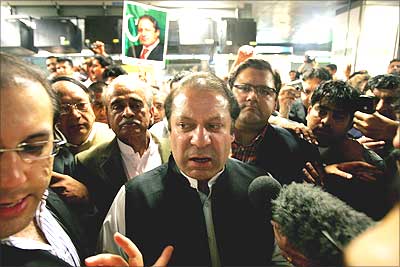
Hours before his meeting with United States President Barack Obama at the White House, Pakistani Prime Minister Nawaz Sharif warned that continuing drone strikes by the US on his country’s territory would be a detriment to eliminating terrorism and called for its immediate halt.
But despite Sharif’s protestations and also the concern expressed by the United Nations and Amnesty International that US drone strikes were killing innocent civilians, including a 68-year-old grandmother who was hit while farming with her grandchildren, the White House pushed back defending these strikes arguing that they were within international law and vowing to continue these attacks.
Sharif, during remarks at the US Institute of Peace, said, drone strikes “have deeply disturbed and agitated our people.”
He said the use of these drones were “not only a continued violation of our territorial integrity, but also detrimental to our resolve and efforts at eliminating terrorism from our country.”
Sharif asserted that, “This issue has become a major irritant in our bilateral relations as well,” and added, “I would therefore stress the need for an end to drone attacks.”
But White House spokesman Jay Carney, asked how the administration sees these types of reports squaring with the president’s comments that the US doesn’t conduct drone strikes unless there is near certainty that no civilians are killed, and also, what the president plans to say about these drone strikes when he has his meeting with the Pakistani leader, said, “We are reviewing these reports carefully.”
Carney recalled, “As a part of his commitment to transparency, in a comprehensive address at the NationalDefenseUniversity on May 23of this year, President Obama laid out the legal and policy framework for the US counterterrorism strategy. He directly addressed the issue of civilian casualties in that speech and he made clear that it is a hard fact that US strikes have resulted in civilian casualties -- a risk that exists in every war.”
But the spokesman said Obama had “also made clear that there is a wide gap between US assessments of such casualties and nongovernmental reports.”
“To the extent these reports claim that the US has acted contrary to international law, we would strongly disagree. The administration has repeatedly emphasised the extraordinary care that we take to make sure counterterrorism actions are in accordance with all applicable law,” he said.
Carney, continuing to invoke Obama’s speech at the NDU, said, ‘In the president’s speech, he addressed why the US may choose to undertake strikes using drones. He said, “Conventional airpower or missiles are far less precise than drones and are likely to cause more civilian casualties and more local outrage. Invasions lead us to be viewed as occupying armies, unleash a torrent of unintended consequences, are difficult to contain, result in large numbers of civilian casualties and ultimately empower those who thrive on violent conflict.”
Thus, he argued, “It’s important to note that by narrowly targeting our action against those who want to kill us and not the people they hide among, we are choosing the course of action least likely to result in the loss of innocent life.”
Carney said, “US counter-terrorism operations are precise, they are lawful, and they are effective. And the US does not take lethal strikes when we or our partners have the ability to capture individual terrorists. Our preference is always to detain, interrogate, and prosecute.”
But he reiterated, “We take extraordinary care to make sure that our counter-terrorism actions are in accordance with all applicable domestic and international law and that they are consistent with US values and policy.”
Carney said, “We have demonstrated in the policies that we have adopted and the strategies that we develop and execute that we take the matter of civilian casualties enormously seriously and that the actions that we take, we take mindful of the absolute need to limit civilian casualties and to, in this case, reach a standard of near certainty that no civilians will be killed or injured, which is the highest standard we or any country could set.”
He expressed confidence that the ongoing drone strikes meets that standard, and once again invoking the president said, although he couldn’t speak about specific operations, said, ‘the policies that the president spoke about in his speech at NDU, when they are executed, meet international and domestic legal obligations and meet the standards set of near certainty that I just mentioned.”
Carney said, “The president has committed to undertaking these activities with the greatest possible transparency and we will continue to share as much information as possible about them with the American people, the Congress, and the international community, consistent with our national security needs and the proper functioning of the executive branch.”










